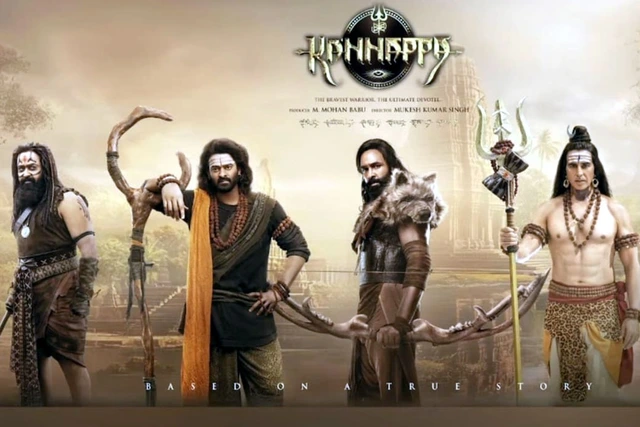The much-anticipated Kannappa movie review is finally here—and it’s one that’s sparking heated debate across social media, review sites, and fan forums. Touted as a grand mythological epic rooted in Indian lore, Kannappa arrives in theaters with high expectations. But does it live up to the hype?
In this Kannappa movie review, we break down the film’s most impactful strengths and its glaring weaknesses. Whether you’re watching from the U.S. or India, this honest Kannappa movie review reveals what truly lies beneath the film’s glossy visuals and spiritual ambition.
Table of Contents

Kannappa Movie Review – A Legend Reimagined, but Not Refined
Let’s start this Kannappa movie review with the plot. Based on the story of a tribal hunter turned saint, the film explores the deeply devotional journey of Kannappa, a man whose love for Lord Shiva knows no bounds. While the premise of this Kannappa movie review sounds promising, the execution is a different story.
1. Kannappa Movie Review: Spectacle Without Soul1
The film’s visuals are undeniably spectacular. The CGI, landscapes, and divine depictions are visually arresting. But what this Kannappa movie review must point out is the lack of emotional depth. You’ll find yourself impressed by the grandeur, but unmoved by the characters.
Every Kannappa movie review must address that while the scale is ambitious, it lacks the narrative maturity seen in films like Baahubali or RRR. This Kannappa movie review highlights that no matter how pretty a film looks, it still needs heart—and Kannappa doesn’t always deliver it.
2. The Lead Performance Is Passionate, But Not Polished In kannappa movie
Vishnu Manchu, who also co-produced the film, throws his heart and soul into the lead role of Kannappa. He undergoes a physical transformation, delivers emotionally charged monologues, and displays a raw intensity. Still, the acting sometimes lacks nuance.
There are moments where the emotion feels forced—especially in key devotional scenes that should have been subtle but are played with theatrical exaggeration. It’s a passionate performance, no doubt, but one that could’ve benefited from tighter direction and editing.
3. Supporting Cast Fails to Make an Impact
For a film steeped in divine mythology, one expects strong supporting characters—gods, sages, enemies—that leave a lasting impression. Unfortunately, aside from brief appearances by notable stars like Mohan Babu and Prabhas (in an extended cameo), most characters feel like cardboard cutouts.
This is especially disappointing considering the film’s high-profile casting announcements leading up to its release. The supporting roles feel underwritten and underutilized, making it difficult for viewers to emotionally invest in anyone beyond the lead.
4. The Music Score Is Overused and Misplaced in Kannappa.
In mythological epics, music can elevate a film into the realm of timeless classics. Unfortunately, Kannappa uses its background score like a crutch rather than a tool.
Thumping drums and operatic chants dominate nearly every dramatic scene, leaving no room for silence or subtlety. Instead of amplifying emotion, the music becomes distracting. Even the soundtrack songs, while lyrically rich, are awkwardly placed and feel like interruptions rather than narrative enhancements.
5. The Storytelling Lacks Flow and Emotional Connection In Kannappa.
The original legend of Kannappa is deeply spiritual—filled with personal sacrifice and unwavering devotion. While the film touches on these elements, the storytelling feels fragmented and overly ambitious.
Instead of focusing on the intimate journey of a man’s devotion to Shiva, the film adds unnecessary side plots and action sequences that dilute the core narrative. The final sacrifice scene, which should have been emotionally devastating, lacks the emotional punch because the buildup was too scattered.
The Cultural Significance vs. Cinematic Reality
It’s important to acknowledge that Kannappa holds immense cultural value. Retelling the life of a revered figure from Shaivite tradition for a modern audience is a commendable undertaking. It introduces new generations, especially in the diaspora, to a tale of unshakable faith and transformation.
However, a film with such a revered spiritual figure requires storytelling that moves the soul, not just dazzles the eyes. And that’s where Kannappa struggles—it delivers spectacle but often misses emotional and spiritual resonance.
Western Audience Reaction to Kannappa
American audiences, especially those with an interest in world cinema, are approaching Kannappa with curiosity. Many have praised the attempt to showcase ancient Indian mythology with modern technology. But those unfamiliar with the cultural context often feel alienated by the film’s uneven tone and pacing.
There’s also criticism around the lack of universal storytelling structure, which makes it hard for international viewers to follow the emotional arc. While RRR and Baahubali found ways to connect with non-Indian audiences, Kannappa doesn’t quite bridge that gap.
Final Verdict
In conclusion, Kannappa is a film with epic ambition but uneven execution. It tries to do justice to a sacred story with grandeur and earnestness, but falls short due to bloated writing, inconsistent performances, and a lack of emotional grounding.
Fans of mythological cinema may still find moments to admire, especially in its devotion to visuals and scale. But those seeking a spiritually profound or tightly-written experience may walk away disappointed.
Overall Rating: ★★☆☆☆ (2 out of 5 stars)
- 5 Surprising Powers the Senate Parliamentarian Wields Over U.S. Lawmaking
- 7 Epic Reasons Why the Adam Sandler Tour Is a Must-See Comedy Event in 2025
- 7 Powerful Reasons Why Rick Hurst’s Legacy Still Matters After His Passing
- 9 Devastating Impacts of the Latest China Flooding Crisis You Need to Know
- 7 Alarming Revelations from the Latest COVID Vaccines Heart Risk Warning Update

2 thoughts on “5 Brutal Truths in the Kannappa Movie Review That Fans Need to Hear”